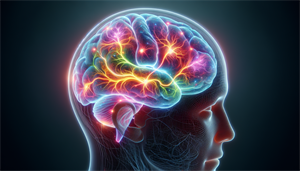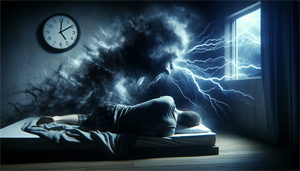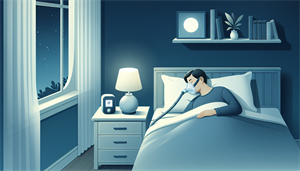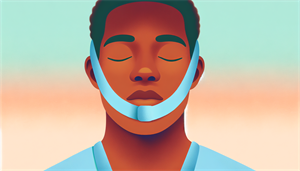Sleep, an essential part of our daily routine, plays a critical role in our overall well-being. But what happens when our sleep is affected by disorders like sleep apnea, potentially leading to more severe conditions such as seizures?
The interplay between sleep apnea and seizures is a complex one, and understanding it is vital.
Key Takeaways
-
Obstructive sleep apnea (OSA) is linked to increased frequency of seizures, with effective treatment of sleep apnea potentially helping to reduce seizure occurrence.
-
Various types of seizures, such as nocturnal, frontal lobe, and complex partial seizures, can disrupt normal sleep patterns and are sometimes associated with sleep disorders.
-
Effective diagnosis of sleep apnea and seizures often involves sleep studies, EEG testing, and thorough medical evaluations, with treatment options including CPAP therapy, anti-seizure medication, and lifestyle changes.
The Connection Between Sleep Apnea and Seizures

There’s a notable connection between sleep apnea, especially obstructive sleep apnea (OSA), and an increased frequency of seizures. This sleep disorder is characterized by repeated breathing disruptions during sleep, which can exacerbate or even trigger seizures. The intriguing aspect of this relationship is how treating sleep apnea could potentially help reduce the risk of seizures.
Conversely, seizures have the potential to interfere with regular sleep patterns. This cycle between sleep apnea and seizures creates a complex interplay that can lead to misdiagnosis. In one case study, events initially believed to be seizures were identified as respiratory events triggered by the patient’s sleep apnea. After the implementation of continuous positive airway pressure (CPAP) therapy to treat sleep apnea, the symptoms previously interpreted as seizure activity were relieved.
Obstructive Sleep Apnea
Obstructive sleep apnea (OSA), a prevalent sleep disorder, impacts nearly 1 billion adults aged 30–69 years globally, including 39 million individuals in the U.S alone. Untreated sleep apnea, specifically obstructive sleep apnea, is characterized by:
-
repeated breathing interruptions during sleep
-
increased brain activity
-
raised neuronal excitability
-
potentially triggering seizures.
A case that illustrates this relationship featured:
-
a 61-year-old male diagnosed with OSA
-
a history of epileptic seizure-like events
-
these seizure-like events were later determined to be non-epileptic spells triggered by apnea-related arousals.
Sleep Deprivation and Seizures
As sleep deprivation heightens neuronal excitability, which can cause abnormal neuron firing in the brain, it is acknowledged as a trigger for seizures. Difficulty falling asleep can contribute to sleep deprivation, thus elevating the risk of seizures.
Furthermore, nocturnal seizures can disrupt sleep, contributing to poor sleep quality. These disruptions can make seizures more likely to occur, creating a challenging cycle for individuals with epilepsy.
Thus, improving sleep quality, particularly slow wave sleep, plays a crucial role in managing seizures and enhancing the life quality of epilepsy patients.
Types of Seizures Associated with Sleep Disorders

Sleep disorders can be associated with various types of seizure disorders, including sleep related seizures, nocturnal seizures, frontal lobe seizures, and complex partial seizures. These seizures not only disrupt normal sleep patterns but can also be difficult to identify due to their occurrence during sleep.
Nocturnal Seizures
Manifesting during sleep, nocturnal seizures can often be a preliminary sign of epilepsy. These seizures can increase the risk of mortality from epilepsy and make individuals more susceptible to injuries. Thus, seeking immediate medical help is essential to control nighttime seizures and reduce the risk of epilepsy complications.
These seizures often disrupt sleep patterns, making individuals feel tired during the day. Furthermore, seizures occur during the night, making it difficult for individuals to maintain a consistent sleep schedule, which is crucial for good sleep hygiene and overall health. This can lead to daytime sleepiness, affecting their daily activities.
Frontal Lobe Seizures
Frequently occurring during sleep, frontal lobe seizures can appear in clusters, causing disturbances in sleep patterns and affecting sleep behavior. These seizures can be triggered by various factors, including:
-
epilepsy
-
alcohol consumption
-
smoking
-
insufficient sleep
-
acute stress
-
the presence of tumors
-
stroke
-
infections
-
traumatic injuries
-
hormonal shifts
-
certain medications
Understanding and managing these triggers can help control the occurrence of these seizures, ultimately improving sleep quality. However, as these seizures often occur during sleep, they can be mistaken for sleep disorders, leading to potential misdiagnosis and inadequate treatment.
Complex Partial Seizures
Due to their resulting confusion and memory impairment, complex partial seizures can be difficult to distinguish from sleep disorders. These seizures can occur during sleep, making them a type of sleep-related seizure. Conditions such as frontal lobe epilepsy can manifest seizures during NREM sleep, contributing to disturbed sleep patterns.
It’s important to note that individuals with complex partial seizures may have a higher propensity for developing sleep apnea. Addressing sleep apnea may result in a reduction of seizures in these individuals.
Diagnosing Sleep Apnea and Seizures

To diagnose sleep apnea and seizures, a series of tests such as sleep studies, EEG testing, and medical evaluations are employed. These diagnostic measures help identify the cause of the symptoms, paving the way for an effective treatment plan.
Sleep Studies
In diagnosing sleep apnea and other potential seizure-inducing sleep disorders, sleep studies are a vital tool. These studies involve monitoring and recording various body systems during sleep, providing a detailed understanding of an individual’s sleep patterns.
Specific parameters such as the Apnea-Hypopnea Index (AHI) and total time of sleep are closely monitored during a sleep study to assess the severity of sleep apnea. These measurements are essential for accurately assessing the severity of sleep apnea and strategizing an appropriate treatment plan.
EEG Testing
EEG testing is helpful in pinpointing seizure activity in the brain and distinguishing epileptic events from non-epileptic ones. This test involves affixing small metal discs (electrodes) to the scalp to measure the electrical activity in the brain.
Abnormal EEG results can indicate the presence of epileptiform and non-epileptiform abnormalities, suggesting the absence or presence of seizure activity during the recording period. However, it’s worth noting that routine EEG has limitations in detecting abnormalities after a FSUS, with a sensitivity of 17% and specificity of 95%.
On the other hand, ambulatory EEG has a higher sensitivity of 72% in capturing seizures.
Medical Evaluations
Comprehensive patient history and physical examination, which are part of medical evaluations, are essential to secure an accurate diagnosis and plan an effective treatment. A thorough examination allows healthcare providers to assess the upper airway and examine for obesity and physical traits that elevate the risk of sleep apnea.
Patient history is of utmost importance in the medical evaluation for diagnosing sleep apnea-related seizures. Inadequate history is the leading cause of misdiagnosis, making it crucial to consider the diagnosis and treatment of obstructive sleep apnea in epilepsy patients with poor seizure control and/or reappearance.
Treatment Options for Sleep Apnea-Related Seizures

Treatment options for sleep apnea-related seizures are diverse, encompassing CPAP therapy, anti-seizure medication, and lifestyle modifications. These treatments aim to alleviate symptoms, improve overall health, and reduce the frequency of seizures.
CPAP Therapy
The purpose of CPAP therapy is to mitigate symptoms of sleep apnea. This therapy delivers pressurized air through a mask and tube, thus maintaining the openness of the airway and facilitating easier breathing for the individual.
Scientific research has demonstrated that CPAP therapy is effective in reducing the frequency of seizures in patients with epilepsy and obstructive sleep apnea (OSA) who adhere to the treatment. Non-adherence to CPAP therapy increases the risk of seizures.
Anti-Seizure Medication
By modulating the excitability of brain neurons, anti-seizure medications aid in controlling seizure activity. Medications such as phenobarbital, benzodiazepines, and phenytoin are frequently prescribed for managing seizures related to sleep apnea.
While these medications play a significant role in controlling seizure activity, they may also lead to a range of side effects that can impact sleep quality, such as drowsiness, sleepiness, and occasionally insomnia.
Lifestyle Changes
Lifestyle modifications also hold substantial importance in managing seizures related to sleep apnea. Maintaining a healthy weight can decrease nighttime breathing obstructions, enhance blood pressure, and improve overall health, thus potentially reducing symptoms of sleep apnea and lowering the risk of seizures.
In addition to weight management, practicing good sleep hygiene plays a significant role in improving sleep quality and reducing sleep deprivation, which is a recognized trigger for seizures in individuals with sleep apnea. Dietary modifications can also contribute to the overall management of seizures and improve sleep quality.
Preventing Sleep Apnea-Related Seizures

Prevention of sleep apnea-related seizures holds equal importance as their treatment. This involves weight management, practicing good sleep hygiene, and seeking timely medical intervention for sleep disorders and seizure symptoms.
Weight Management
Given that excess weight is the primary risk factor for the onset and severity of obstructive sleep apnea (OSA), effective weight management is pivotal in controlling the disorder. Weight loss can greatly reduce the frequency of seizures in individuals with sleep apnea by lessening the severity of OSA.
To manage their weight effectively, individuals with sleep apnea are advised to reduce calorie intake while maintaining a well-balanced and nutritious diet.
Sleep Hygiene
Another vital preventative step is upholding good sleep hygiene. This involves:
-
Adhering to a strict sleep schedule
-
Following a bedtime routine
-
Cultivating healthy habits
-
Optimizing your bedroom environment.
Maintaining a consistent sleep schedule can have a positive impact on managing sleep apnea and reducing seizures by enhancing overall sleep quality and decreasing the frequency of seizures. Furthermore, establishing a calming sleep environment can significantly improve sleep quality.
Timely Medical Intervention
Timely medical intervention is of utmost importance for addressing sleep disorders and seizure symptoms, as it is essential for accurate diagnosis and effective treatment, ultimately leading to a reduction in the risk of sleep apnea-related seizures.
Immediate medical intervention, such as CPAP therapy, can potentially decrease epileptic seizures in patients with sleep apnea and enhance the prognosis by relieving symptoms and reducing the overall frequency of seizures.
Summary
Understanding the complex interplay between sleep apnea and seizures is crucial in managing these conditions effectively. By identifying the types of seizures associated with sleep disorders and seeking timely diagnosis, one can choose the appropriate treatment option, whether it’s CPAP therapy, anti-seizure medication, or lifestyle changes. Prevention is equally important, and this involves weight management, practicing good sleep hygiene, and seeking timely medical intervention. By taking these steps, we can improve our sleep quality, reduce the risk of seizures, and ultimately enhance our overall health and well-being.
Frequently Asked Questions
Can sleep apnea trigger seizures?
Yes, untreated sleep apnea can contribute to seizures by impacting the brain in ways that make seizures more likely. It is important to seek treatment for sleep apnea to reduce the risk of seizures.
Can sleep apnea be misdiagnosed as epilepsy?
Yes, sleep apnea can be misdiagnosed as epilepsy, leading to unnecessary treatment with antiepileptic medications. It's important to consider a sleep study to differentiate between the two conditions.
What are nocturnal seizures and how do they affect sleep?
Nocturnal seizures are seizures that happen during sleep and can be an early sign of epilepsy. They can disrupt sleep patterns and lead to poor sleep quality.
How important is weight management in controlling sleep apnea and seizures?
Weight management is crucial in controlling sleep apnea and seizures, as excess weight is a significant risk factor for sleep apnea. Managing weight can reduce the severity of sleep apnea and potentially lower the risk of seizures.
How can good sleep hygiene help prevent sleep apnea-related seizures?
Good sleep hygiene, including maintaining a consistent sleep schedule and cultivating healthy habits, can help prevent sleep apnea-related seizures by improving sleep quality and reducing the risk of seizures caused by sleep deprivation.


